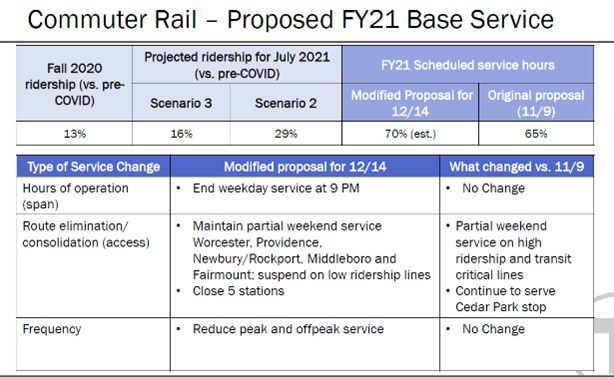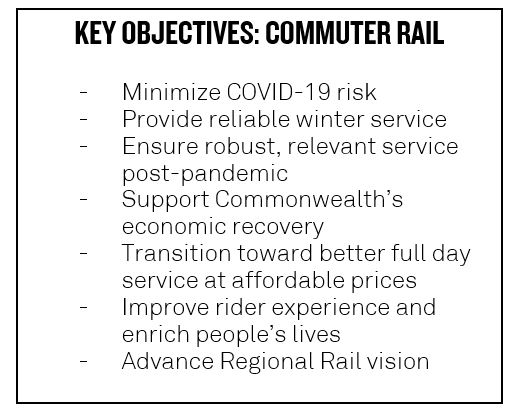Service Cuts Vote Signals A Passive Stance to Public Transit in Commonwealth
December 21, 2020
WRITTEN BY CAITLIN ALLEN-CONNELLY, Project Director
Responding Rather than Leading Demand Is the Wrong Approach
On December 14th, the FMCB voted to cut transit service, in a manner that is ill-timed, in some cases not well defined, and unjustified from both a budgetary and service delivery standpoint. Despite an amendment requiring staff to reassess service levels in March 2021, the vote effectively locks the MBTA into a reduced schedule that for some modes, in particular the Commuter Rail, cannot be adjusted should ridership increase before FY22, which starts on July 1, 2021. Secretary Pollack confirmed the lack of operational flexibility prior to the vote, stating that it would not be possible in March to reverse service level reductions for the spring. Additionally, General Manager Poftak’s request to add “as feasible” to the reassessment clause, which was accepted, essentially protects the MBTA from having to rework spring schedules.
We are now at the beginning of a roughly 6-10-month process widespread vaccination effort. The MBTA must send a signal to commuters that they can rely on this vital service to meet their needs during the coming months when Greater Boston will be emerging from the worst of the COVID-19 pandemic. The T should be leaning in to facilitate transit service to both support and induce demand. Prior to the pandemic, more than 1.2 million trips into Boston were made daily and recent employee and employer surveys suggest that the vast majority of pre-pandemic T commuters plan to return to the T when they return to the office.
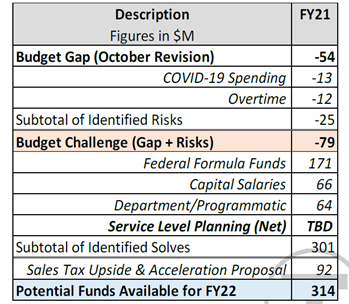
The MBTA received $830 million in federal CARES Act funding, making the T’s budget whole in FY21 and providing a significant buffer for FY22. The T it is also poised to potentially receive another round of federal transit aid, which would eliminate the budgetary imperative for service cuts and position the MBTA to think ahead in terms of service delivery and critical infrastructure projects.
There is still time to correct course. Details on frequency, hours of operation, layoffs, and restoration timeframes for the Commuter Rail are still to be determined by the MBTA. The T has the opportunity to build better service and to invest in projects that align with key transformational goals, such as Rail Vision, and set the region up for success.
A Better City offers the following recommendations for service changes on the Commuter Rail and Ferry that have not yet been determined, and puts forth a list of priority projects that should be advanced in the event of a federal infrastructure bill. These proposals are designed to help the system build back better, provide enhanced service to support the region’s economic recovery, and accommodate the dynamic, evolving needs of commuters.
Building Back Better
The approved service cuts hinder the region’s economic recovery, jeopardize the future of the transit system, and curtail the Commonwealth’s ability to achieve its greenhouse gas emission reduction targets. The MBTA should be sending a clear message to the region that it is ready, willing, and able to accommodate riders when they return. Retaining and demonstrating operational flexibility, therefore, is essential to drive the return to public transit post-pandemic.
The mid-December vote on service cuts lacked specifics on the nature and extent of Commuter Rail and Ferry service for the remainder of FY21. The proposal gave no details on the number of trains or ferries, schedules, and hours of operation, layoffs and restoration timeframes.
|
|
|
As discussions about the Commuter Rail and Ferry move forward and momentum on federal funding continues, A Better City encourages the MBTA to develop a service plan that not only meets rider needs today but also provides better for service tomorrow. The T should pilot flexible fare policies to attract more riders in the future and allow for flexibility to quickly ramp up service post-pandemic. Additionally, the MBTA must continue to advance critical state of good repair and marquee infrastructure projects.
COMMUTER RAIL
Ridership and Commuter Rail usage during the pandemic have changed. There is less demand for peak hour service and increased need for service throughout the day to accommodate essential workers and flexible work schedules. These trends will likely continue during the transition back to the workplace and may take hold going forward.
This shift opens up the possibility to smooth out service during the day, and as discussions progress with the MBTA with respect to frequency and schedules in FY21, this concept should be adopted. It not only addresses changing demand induced by COVID-19 work schedules, but also allows for physical distancing and creates the opportunity to use the current Commuter Rail workforce more efficiently. Additionally, enhancing daytime headways would advance the Commonwealth’s regional rail vision goals.
Implementing a “clock-face schedule,” which allows for service to run at consistent intervals rather than by demand with irregular headways, creates a more user-friendly and predictable schedule for riders. This is precisely what the MBTA needs to ensure safe, reliable, adequate service delivery. Pre-pandemic, the Commuter Rail and other MBTA modes were running at crush capacity—in the post COVID-19 world, at least in the short term, commuters will demand less crowded cars and reliable service.
The economic impact of the pandemic has touched individuals and businesses. Recent employee surveys indicate that reduced fares could incentivize individuals to return to public transit, in particular if their weekly usage decreases from 5 days a week to 2-3 days a week. Leading with fare options will lead demand and entice riders to use public transit rather than shift to another mode, likely driving. The weekend pass introduced by the T in 2018 was successful; piloting a range of alternatives to a full monthly pass, such as a monthly flex pass, could also see similar success.
FERRY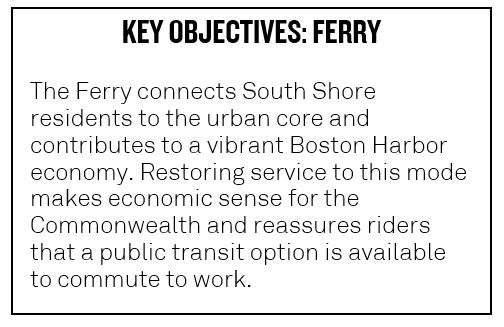
The Ferry is a vital service that connects commuters from Hingham, Hull, and Charlestown to the urban core. It is also integrally connected to other Boston Harbor services and businesses that employ Massachusetts workers and attract tourists to the city and harbor islands.
Pre-pandemic the Ferry carried 6,673 people to and from Boston daily. Ridership during COVID-19 has decreased but some demand ensures and is expected to rebound when the workforce returns to the workplace.
The approved service cuts to the Ferry maintain only one of three routes, the Hingham/Hull route. The service plan for the Hingham/Hull route is still under development. Until March 2021, the MBTA should run Ferry service at or exceeding the 2017 MBTA Service Delivery Policy standard, which at a minimum ensures three trips during peak hours, one trip every three hours off peak, and provides service from 7 AM to 6:30 PM. Every effort should be made by the MBTA to ensure that Ferry service can be restored to pre-pandemic full service in July 2021. Anything short of that will have a ripple effect.
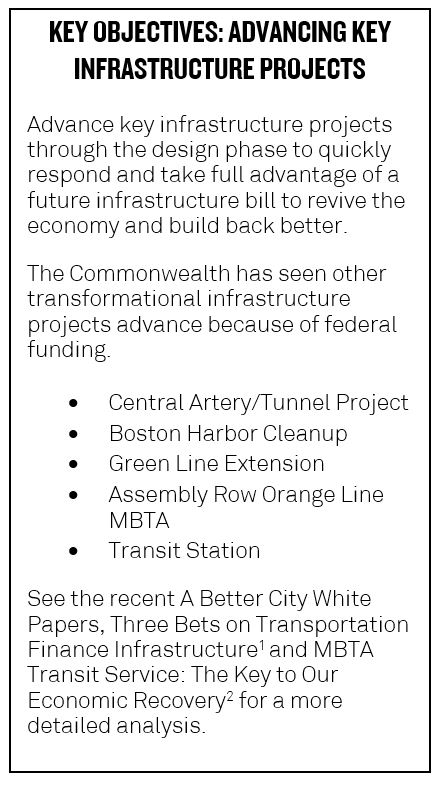 Investing in Transformational Infrastructure Projects
Investing in Transformational Infrastructure Projects
Leading demand is not just about service delivery options, it is about building a public transit system that is fit for the ever-changing mobility, equity, and climate needs.
There are key transportation projects identified in Focus40 and the Governor’s Commission on the Future of Transportation report—such as the Red-Blue connector, an electrified regional Commuter Rail system, an all-electric bus fleet, and improved maintenance facilities—that could be supported in part by federal funds. The MBTA should accelerate efforts to move these transformational capital projects through the design phase so they are ready to receive federal funds. The Commonwealth cannot afford to be caught flat-footed when federal funding becomes available. A clarity of purpose will also send a helpful signal to our federal delegation that there is an opportunity to work together on large-scale infrastructure projects.
ADDENDUM: OVERVIEW OF APPROVED MBTA SERVICE CUTS3
BUSES:
- Service will be suspended on 20 routes, while 16 routes will be consolidated and four will be shortened.
- In Malden and Melrose, peak service will continue on bus route 131, and routes 136 and 137 will be combined.
- Route 230 will continue to operate between Braintree and Quincy Center.
- Some service will continue on routes 714 and 716 in Hull and Canton.
- There will be some service on route 43 in Roxbury and the South End.
- Hours of operation will remain the same with buses running after midnight.
SUBWAY:
- The E branch of the Green Line will continue to operate to Heath Street and serve all stops.
- Train frequency will be reduced by 5% on the Blue Line and 20% on the Green, Orange and Red lines. Right now the T aims to have 4 and a half minutes in between trains on the Red Line during peak hours. A 20% reduction in frequency would results in up to 5 and a half minutes between trains according to MBTA general manager Steve Poftak.
- Hours of operation will remain the same with trains running after midnight.
COMMUTER RAIL:
- There will be less frequent service on the Commuter Rail and weekday service hours may be adjusted.
- There will be weekend service on some Commuter Rail lines—Providence, Worcester, Middleboro, Newburyport/Rockport, and Fairmount, which have been deemed to be "transit critical" or heavily used by essential workers and/or have higher ridership. These lines represent two-thirds of all weekend ridership, according to the MBTA.
- Five commuter rail stations will be closed—Plimptonville, Prides Crossing, Silver Hill, Hastings, Plymouth. (The T no longer plans to close the Cedar Park stop on the Haverhill line.)
FERRIES:
- There will be some service on the Hingham/Hull weekday ferry. Service may be limited to peak/commuter hours and the T is still determining what the exact schedule will be and whether or not all Boston stops will be served.
- The Charlestown ferry and Hingham direct service will be suspended.
SOURCES & REFERENCES
1. https://www.abettercity.org/assets/images/3Bets White Paper FINAL.pdf
3. https://www.wbur.org/bostonomix/2020/12/14/mbta-control-board-approves-service-cuts
Comments (0)
- 1




